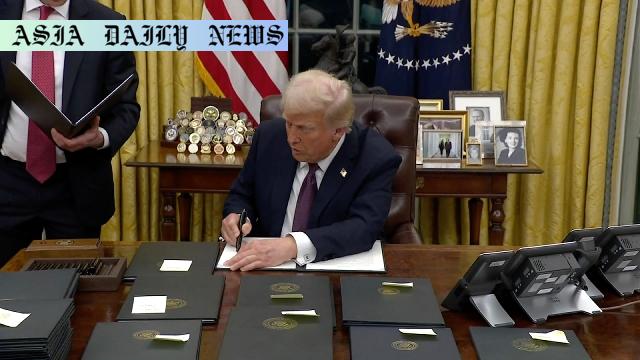Birthright Citizenship: A federal court in Washington blocked Trump’s order redefining birthright citizenship, labeling it unconstitutional.
- A federal court blocked Trump’s executive order on birthright citizenship for 14 days.
- The order was deemed unconstitutional by Judge John Coughenour.
- The ruling faces pending appeals as Trump intends to contest the injunction nationwide.
- Multiple states and groups filed lawsuits, arguing the executive order undermines constitutional protections.

The Legal Challenge Against Trump’s Executive Order
A federal court in Seattle, Washington, has placed a temporary freeze on President Donald Trump’s executive order, which sought to alter the longstanding principle of birthright citizenship in the United States. The temporary restraining order will last for 14 days and could be extended, noted US District Judge John Coughenour, who presided over the case. This development follows a lawsuit initiated by four states—Washington, Arizona, Illinois, and Oregon—challenging the constitutionality of the order.
Understanding Birthright Citizenship
Birthright citizenship, codified under the Fourteenth Amendment of the US Constitution, ensures that anyone born on American soil automatically becomes a citizen, regardless of the immigration status of their parents. President Trump’s executive order attempted to bypass this rule by redefining its scope, targeting primarily children of undocumented immigrants. The administration justified the measure as part of broader efforts to curtail illegal immigration.
Key Arguments Presented in Court
During Thursday’s hearing, the court addressed legal arguments from both sides. Representatives from the Democratic-led states asserted that Trump’s executive order blatantly contradicts constitutional provisions. Judge Coughenour concurred, calling the order “blatantly unconstitutional” and questioning the Department of Justice attorney’s defense of its legality. He remarked, “I have difficulty understanding how a member of the bar can state unequivocally that this is a constitutional order.”
A Nationwide Impact
The decision by the court applies across the United States, providing temporary relief to those opposing the executive order. The New York Times reported that the ruling affects all states and supersedes any immediate attempts to implement the executive measures. This sets the stage for a nationwide legal battle, as the Trump administration has expressed intentions to appeal the decision.
Political Ramifications and Public Response
The case has reignited intense political debate over immigration policies in the United States. Opponents of the executive order argue it undermines fundamental constitutional protections, while supporters view it as a necessary step to address concerns over illegal immigration. The lawsuits against the order have united various Democratic-led states, advocacy groups, and legal experts who consider the measure an overreach of executive authority.
The Road Ahead
As the legal battle unfolds, the temporary nature of the court’s order leaves significant uncertainty for both critics and supporters of the executive measure. If the Trump administration appeals to higher courts, the validity of the executive order could ultimately be determined by the Supreme Court. The question of whether the president has the authority to unilaterally redefine constitutional principles remains a pivotal issue.
Conclusion
The federal court’s decision to block Trump’s executive order on birthright citizenship reflects the ongoing struggles within the US regarding immigration reform, constitutional interpretation, and executive authority. The outcome of this legal clash will have profound implications not only for children born to undocumented immigrants but also for the balance of power between the executive branch and constitutional law. For now, the future of birthright citizenship hangs in the balance as legal experts, the judiciary, and politicians grapple with competing visions of America’s immigration policy.



Commentary
A Judicial Check on Executive Overreach
The federal court’s temporary block on President Trump’s executive order surrounding birthright citizenship highlights the essential function of the judiciary in maintaining constitutional integrity. In a deeply polarized political climate, this ruling serves as a potent reminder of the importance of checks and balances. Judge Coughenour’s strong language condemning the order underscores the significance of this legal confrontation.
The Broader Implications for Immigration Policy
This case also underscores the complexity of immigration policy in the United States. Birthright citizenship has long been a cornerstone of American identity, enshrined in the Fourteenth Amendment. Yet, efforts to redefine it reflect growing tensions over immigration and border security. Policymakers must strike a balance between securing borders and preserving rights enshrined in the Constitution.
What’s at Stake for Citizens and Non-Citizens
For millions of individuals born in the US, the mere contemplation of redefining birthright citizenship introduces an unsettling sense of uncertainty. The executive order’s opponents argue that tampering with such a fundamental right risks creating a subclass of individuals without status—a dangerous precedent in a country that prides itself on equality. These possibilities must be carefully considered as the case progresses.
Looking to the Future
This legal challenge is likely the beginning of an extensive battle, potentially reaching the Supreme Court. However, it also signals a need for broader discussions around comprehensive immigration reform. While the judiciary has temporarily halted the executive order, lasting solutions must emerge from bipartisan collaboration and adherence to constitutional principles.